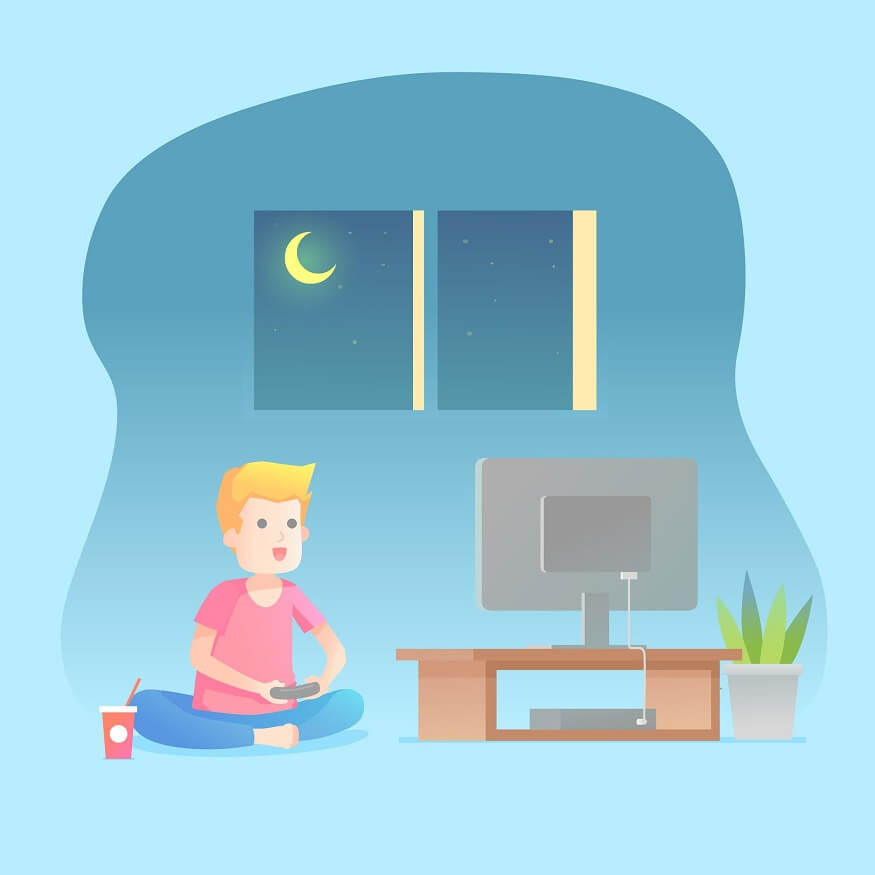Television has become a significant part of our lives in today’s modern society. It keeps us entertained, informed, and educated. Many individuals aren’t aware of how tv affects sleep though. It is critical to comprehend how television influences our sleep habits and general well-being given the growth in late-night binge-watching. We may understand how important it is to strike a balance between our TV habits and obtaining a good night’s sleep by looking at the impact of excessive TV viewing on our sleep. It’s important to think about the potential repercussions of viewing TV before night and make decisions that put our sleep and well-being first. Let’s uncover the awareness of how tv affects sleep disruption and explore strategies to improve our tv and sleep problems in our TV-centric world.
Also Read: Importance of Enough Sleep in Middle and High School Students
1.Blue Light and Melatonin Suppression
TV’s emission of blue light disrupts our sleep by affecting the body’s natural sleep-wake cycle. It can be challenging to fall asleep and get a good night’s sleep at night because of the excessive blue light from TVs and other electronic gadgets that tricks our bodies into believing it is still daylight.
Blue light greatly impacts sleep because it interferes with our body’s normal sleep cycle. Studies show that blue light exposure at night delays the production of melatonin, which makes it harder to fall asleep and reduces the quality of our sleep. To encourage healthier tv and sleep problems, experts advise reducing this influence.
2. Disrupting Sleep Patterns
Television can also disrupt our sleep patterns by stimulating the brain and delaying the onset of sleep. Engaging content, intense action, and cliffhangers can lead to heightened emotions and increased mental activity. As a result, it becomes challenging to unwind and transition into a state of relaxation necessary for quality sleep.
Binge-watching multiple episodes or staying up late to finish a series can also lead to irregular sleep schedules. Our bodies are dependent on routine, so irregular sleep patterns can interfere with the body’s natural sleep-wake cycle and make it more challenging to go to bed at the same time every night.
Establishing a relaxing evening ritual is vital to fend off the disturbance of sleep patterns brought on by TV. Reading a book, having a warm bath, or engaging in relaxation exercises like deep breathing or meditation can all help the body understand that it’s time to wind down and get ready for bed.
3. Psychological Stimulation and Anxiety
The content we watch on television can significantly impact our mental state, leading to psychological stimulation that hinders sleep. Watching thrilling or suspenseful shows before bed can leave us feeling anxious or keyed up, making it difficult to calm our minds and achieve a state of tranquillity necessary for sleep.
Additionally, news programs or disturbing content can induce stress and anxiety, further exacerbating the effects of watching tv before bed. Negative emotions associated with the content can linger, infiltrating our thoughts and making it hard to relax and fall asleep peacefully.
It is recommended to exercise caution when selecting the TV programme we watch before night to prevent the detrimental psychological effects of TV on sleep. Choosing soothing and tranquil media can promote a more relaxed frame of mind that is beneficial to sleep, such as lighthearted comedies or nature documentaries. It’s also essential to establish boundaries with news consumption and avoid watching distressing content close to bedtime.
Also Read: 10 Sleep hacks for students to fall asleep faster
4. Reduced Sleep Quality
Even if we are successful in sleeping while watching TV, the calibre of our sleep may be affected. Shallow sleep and frequent awakenings can result from disruptions to the sleep cycle, such as background noise, flashing displays, and unexpected loud noises. This can result in a feeling of fatigue and grogginess upon waking, affecting our overall productivity and well-being.
Background noise from the TV can interfere with the brain’s ability to enter deep, restorative sleep stages. The constant stimulation from sound can prevent the brain from fully relaxing and achieving the necessary level of tranquillity and optimal sleep.
Moreover, the flickering screens of TVs can disrupt the production of sleep-promoting hormones, leading to less restful sleep. Because of the brain’s confusion caused by the sporadic light bursts, deep, unbroken sleep may not be possible.
It is advised to make the bedroom a sleep-friendly atmosphere to enhance the quality of one’s sleep. Consider using earplugs or white noise machines to block out external sounds, and if possible, move the TV out of the bedroom altogether.
5. Tips for Better Sleep
To mitigate the negative impact of TV on our sleep, here are some practical tips:
- Set a TV curfew: Establish a designated time to turn off the TV and engage in more relaxing activities before bed.
- Create a sleep-friendly environment: Keep the bedroom dark, quiet, and cool to promote optimal sleep conditions.
- Establish a bedtime routine: Engage in calming activities such as reading, meditation, or listening to soothing music to unwind before sleep.
- Limit screen time before bed: Minimise exposure to TV, smartphones, and other electronic devices at least one hour before bedtime to allow your body to produce melatonin naturally.
- Practice moderation: If you enjoy watching TV before bed, limit yourself to one or two episodes of your favourite show, avoiding prolonged binge-watching sessions.
- Consider alternative activities: Explore other pre-sleep activities such as journaling, gentle stretching, or listening to relaxing podcasts or audiobooks.
- Create a technology-free zone: Keep electronic devices, including TVs, out of the bedroom to eliminate the temptation of late-night TV viewing.
- Prioritise sleep hygiene: Ensure you have a comfortable mattress and pillows, maintain a consistent sleep schedule, and avoid consuming caffeine or heavy meals close to bedtime.
Also Read: 25 Books all children should read before they are 18
Conclusion
While television provides entertainment and information, it is crucial to recognise the potential negative effects of tv on sleep. Understanding how TV can interfere with our sleep habits and putting them into practice will help us assure improved sleep quality and general well-being. We may obtain a good night’s rest and wake up feeling refreshed and prepared for the day by developing a sleep regimen and engaging in soothing activities like reading before bed. We must prioritise getting enough sleep because of its importance for our general health. Therefore, as you settle in for a TV marathon, keep in mind how too much screen time might impair your sleep and try to establish a nightly routine that encourages healthier sleep. Your body and mind will thank you for the restful and rejuvenating sleep you’ll experience after knowing the effects of watching tv before bed.
Euroschool is a renowned educational institution dedicated to providing quality education to students. Recognising the importance of a healthy lifestyle, Euroschool emphasises the balance between academic pursuits and personal well-being. This includes fostering awareness about the potential impact of excessive TV viewing on sleep patterns. By encouraging students to develop healthy habits, including limited screen time before bed, Euroschool aims to support their overall well-being, ensuring they have a restful night’s sleep to enhance their focus, concentration, and academic performance.











